2023-2024学年英语鲁教版(五四学制)六年级下册Unit 6 Don’t eat in class单元习题课件(共34张PPT)
文档属性
| 名称 | 2023-2024学年英语鲁教版(五四学制)六年级下册Unit 6 Don’t eat in class单元习题课件(共34张PPT) |  | |
| 格式 | pptx | ||
| 文件大小 | 281.8KB | ||
| 资源类型 | 教案 | ||
| 版本资源 | 鲁教版 | ||
| 科目 | 英语 | ||
| 更新时间 | 2024-07-06 07:32:59 | ||
图片预览

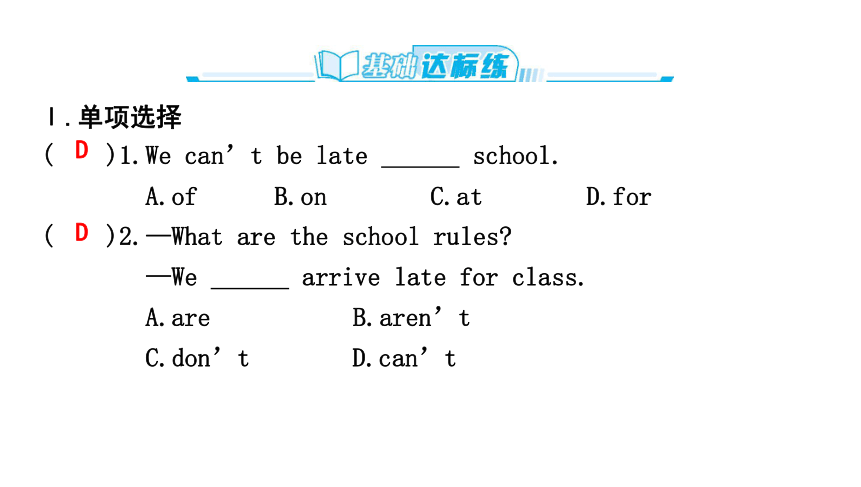
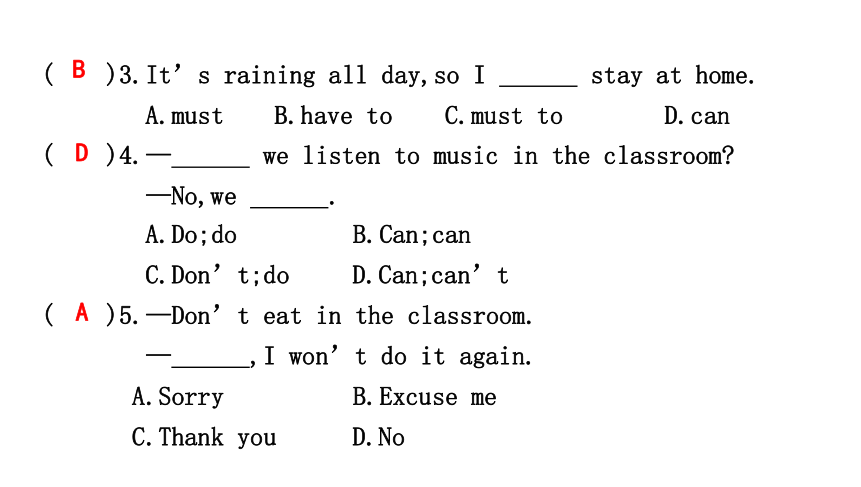
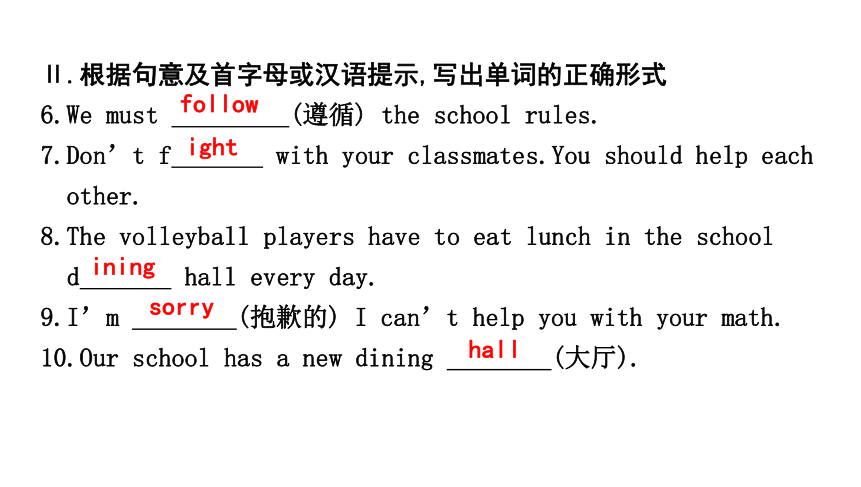
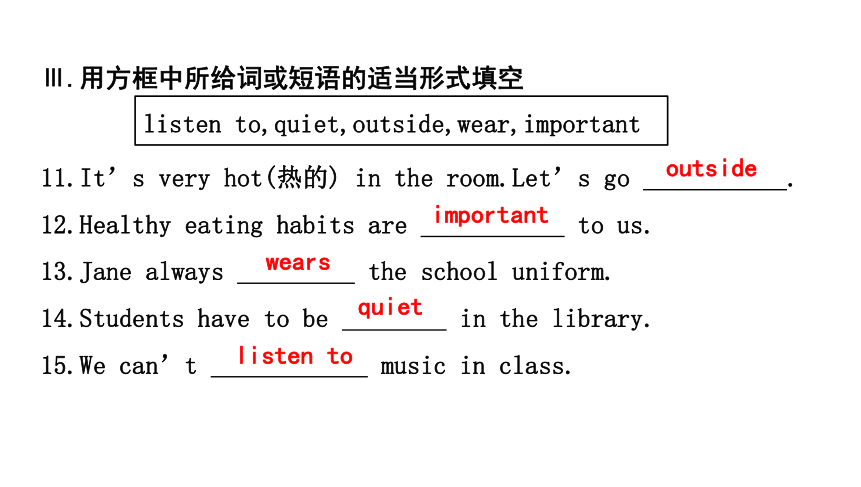

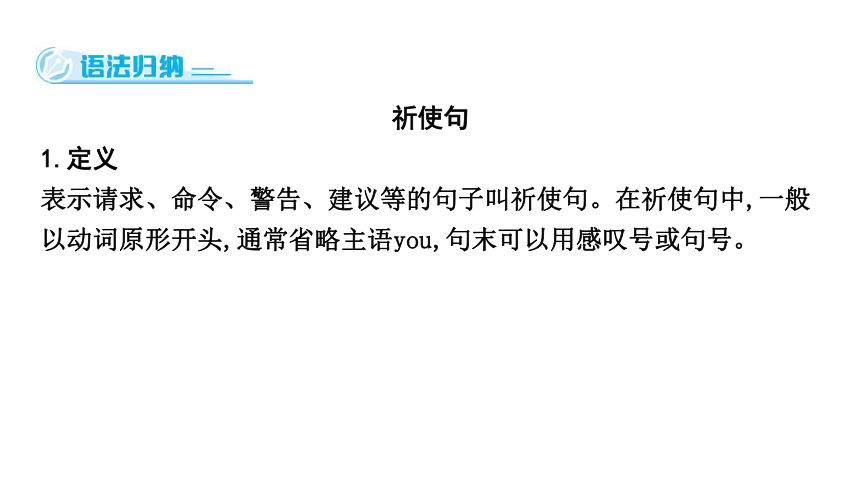
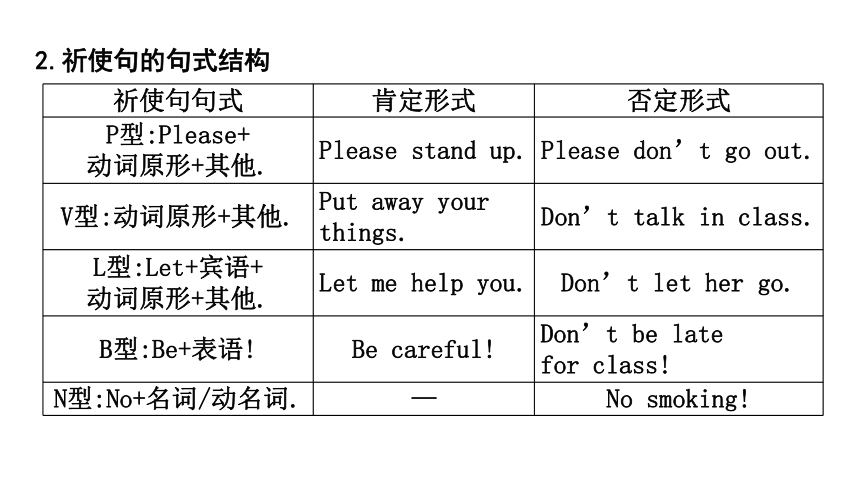
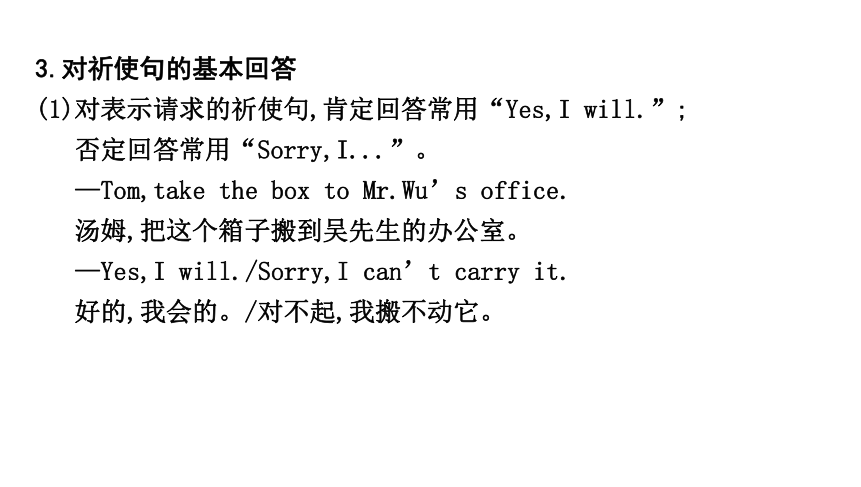
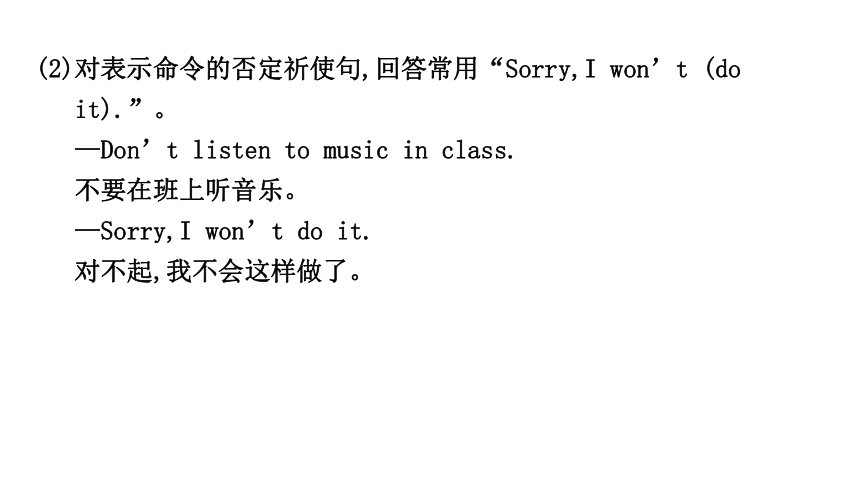
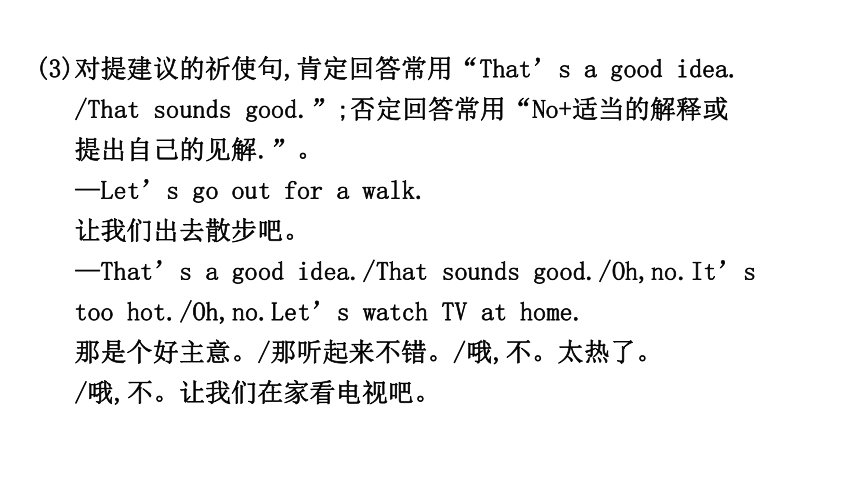
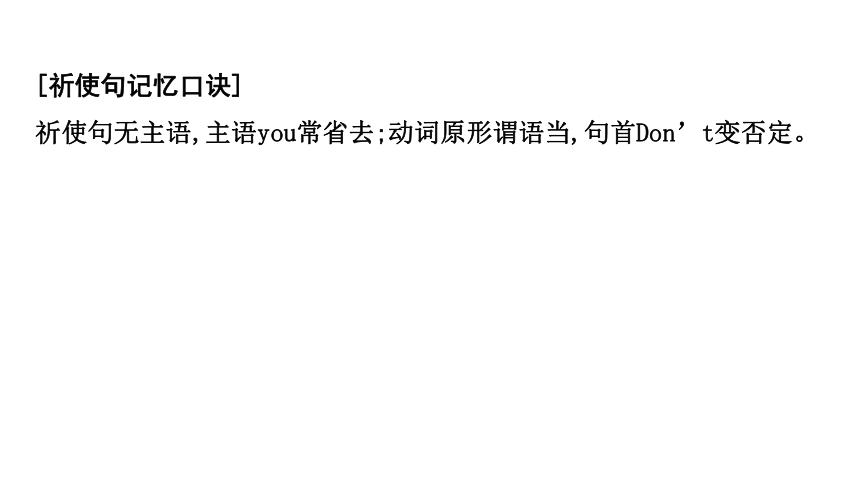
文档简介
(共34张PPT)
Unit 6 Don’t eat in class.
第1课时 Section A (1a-2d)
( )1.We can’t be late school.
A.of B.on C.at D.for
( )2.—What are the school rules
—We arrive late for class.
A.are B.aren’t
C.don’t D.can’t
Ⅰ.单项选择
D
D
( )3.It’s raining all day,so I stay at home.
A.must B.have to C.must to D.can
( )4.— we listen to music in the classroom
—No,we .
B
D
A
A.Do;do B.Can;can
C.Don’t;do D.Can;can’t
( )5.—Don’t eat in the classroom.
— ,I won’t do it again.
A.Sorry B.Excuse me
C.Thank you D.No
Ⅱ.根据句意及首字母或汉语提示,写出单词的正确形式
6.We must (遵循) the school rules.
7.Don’t f with your classmates.You should help each
other.
8.The volleyball players have to eat lunch in the school
d hall every day.
9.I’m (抱歉的) I can’t help you with your math.
10.Our school has a new dining (大厅).
follow
ight
ining
sorry
hall
Ⅲ.用方框中所给词或短语的适当形式填空
listen to,quiet,outside,wear,important
11.It’s very hot(热的) in the room.Let’s go .
12.Healthy eating habits are to us.
13.Jane always the school uniform.
14.Students have to be in the library.
15.We can’t music in class.
outside
important
wears
quiet
listen to
第2课时 Section A (Grammar Focus-3c)
——单元语法归纳
祈使句
1.定义
表示请求、命令、警告、建议等的句子叫祈使句。在祈使句中,一般以动词原形开头,通常省略主语you,句末可以用感叹号或句号。
2.祈使句的句式结构
祈使句句式 肯定形式 否定形式
P型:Please+ 动词原形+其他. Please stand up. Please don’t go out.
V型:动词原形+其他. Put away your things. Don’t talk in class.
L型:Let+宾语+ 动词原形+其他. Let me help you. Don’t let her go.
B型:Be+表语! Be careful! Don’t be late
for class!
N型:No+名词/动名词. — No smoking!
3.对祈使句的基本回答
(1)对表示请求的祈使句,肯定回答常用“Yes,I will.”;
否定回答常用“Sorry,I...”。
—Tom,take the box to Mr.Wu’s office.
汤姆,把这个箱子搬到吴先生的办公室。
—Yes,I will./Sorry,I can’t carry it.
好的,我会的。/对不起,我搬不动它。
(2)对表示命令的否定祈使句,回答常用“Sorry,I won’t (do
it).”。
—Don’t listen to music in class.
不要在班上听音乐。
—Sorry,I won’t do it.
对不起,我不会这样做了。
(3)对提建议的祈使句,肯定回答常用“That’s a good idea.
/That sounds good.”;否定回答常用“No+适当的解释或
提出自己的见解.”。
—Let’s go out for a walk.
让我们出去散步吧。
—That’s a good idea./That sounds good./Oh,no.It’s
too hot./Oh,no.Let’s watch TV at home.
那是个好主意。/那听起来不错。/哦,不。太热了。
/哦,不。让我们在家看电视吧。
[祈使句记忆口诀]
祈使句无主语,主语you常省去;动词原形谓语当,句首Don’t变否定。
Ⅰ.单项选择
( )1. it over,and you will be able to work out the
problem.
A.Thinking B.To think
C.Think D.To thinking
C
( )2.— your hands before dinner,Tony.
—No problem,Mom.
A.Wash B.Washes
C.Washing D.To wash
A
( )3. walk on the grass.
A.Doesn’t B.Don’t
C.Not D.Can’t
( )4.— we leave the library before 5 o’clock
—No,you needn’t.You can stay here until 5:30.
A.Must B.May
C.Can D.Could
B
A
Ⅱ.按要求完成句子
5.We can’t talk in the library.(改为同义句)
in the library.
6.Tom has to clean his room.(就画线部分提问)
Tom to
7.Watch TV after school.(改为否定句)
TV after school.
8.We eat lunch in the dining hall.(改为祈使句)
lunch in the dining hall.
9.Don’t let him listen to music.(改为肯定句)
listen to music.
Don’t
walk
What
does
have
do
Don’t
watch
Let’s
eat
Let
him
第3课时 Section B (1a-1d)
1.I can’t go (外出)on school nights.
2.He often (打架)with his classmates in the
school.
3.I have to finish my homework b I go to bed.
4.Can you help me do the d after dinner,Gina
5.He often p playing basketball in the fternoon.
Ⅰ.根据句意及首字母或汉语提示,写出单词的正确形式
out
fights
efore
ishes
ractices
Ⅱ.根据汉语意思完成句子
6.在周六晚上我不能出去。
I can’t on Saturday night.
7.早饭前我们必须锻炼。
We must play sports .
8.她每天清洗餐具。
She every day.
9.在上学的日子我必须早起。
I have to get up early .
10.他们每天练习开车。
They a car every day.
go
out
before
breakfast
does
the
dishes
on
school
days
practice
driving
第4课时 Section B (2a-2c)
( )1.Our teacher is very strict us our
English.
A.with;in B.with;with
C.in;in D.in;with
( )2.This afternoon we’re going to have an English
class.Remember your book.
A.bringing B.to bring
C.bring D.brought
Ⅰ.单项选择
A
B
( )3.For our safety,we must the traffic rules on
the way to school.
A.follow B.change C.make D.break
( )4.Don’t watch TV.It’s bad for your eyes.
A.too much B.much too
C.too many D.many too
( )5.It’s raining all day,so Jack stay at
home.
A
A
C
A.must B.have to
C.has to D.can
Ⅱ.根据句意及首字母或汉语提示,写出单词的正确形式
6.—How do you f about your school rules
—Not bad.
7.Jack,you must clean your room.It’s too d .
8.My mom is making breakfast for me in the k .
9.It’s (糟糕的) to hear the bad news.
10.My father is tired(疲倦);he needs to (放松).
eel
irty
itchen
terrible
relax
Ⅲ.用括号中所给词的适当形式填空
11.I want to watch TV (relax) myself.
12.Parents and schools make rules (help) us.
13.After school she usually learns (play) the
violin in the music club.
14.I have to practice (play) the piano after I
finish my homework in the evening.
15.I often do the (dish) after dinner.
to relax
to help
to play
playing
dishes
Ⅳ.根据汉语意思完成句子
16.我的妈妈从不把脏盘子留在厨房。
My mother never the dirty dishes in the
.
17.他起床晚了,不得不跑步去学校。
He gets up late and school.
18.我妈妈要我先铺床。
My mother asks me to first.
leaves
kitchen
has
to
run
to
make
the
bed
19.我们必须考虑一下这些规则。
We must these rules.
20.在教室里请保持安静。
Please in the classroom.
think
about
keep
quiet
第5课时 Section B (3a-3c)
——单元话题写作指导
写作话题 谈论规则
具体内容 描述一些日常规则,包括家规、校规及公共场所必须遵守的行为规则等
注意事项 正确使用情态动词can、must、have/has to和祈使句
1.在我家有许多规则。
There are lots of rules in my home.
常用句型:
2.在学校我们有许多规则。
We have many rules at school.
3.我必须在六点半起床。
I have to get up at half past six.
4.八点钟前我们必须到校。
We have to get to school before eight o’clock.
5.在课堂上我们不能吃东西。
We can’t eat in class.
6.我认为这些规则对我们有益。
I think these rules are good for us.
7.这些规则很严格。但我必须遵守它们。
These rules are strict.But I must follow them.
假设你是张兰,你的笔友Rick想了解你们学校的规章制度。请你根据提示,给Rick写一封电子邮件,告诉他你们学校的规章制度。50词左右,电子邮件的开头和结尾已给出,不计入总词数。
内容提示:
1.写作要求
(1)上课不能迟到;
(2)课堂上要保持安静:
(3)见到老师要问好(greet sb.);
(4)不许在教室里吃东西;
(5)不许在课堂上听音乐、玩游戏;
(6)不能摘花爬树(pick flowers,climb trees)。
Dear Rick,
Thanks for your email.Let me tell you about my school rules.
I think they are good for us.What about you
Yours,
Zhang Lan
(1)应用文
2.思路点拨
(2)第一人称
(3)时态:一般现在时
(4)写作导图:
Dear Rick,
Thanks for your email.Let me tell you about my school rules.
We have lots of strict rules at school.First,we can’t arrive late for class.Second,we can’t talk loudly in class.We should be quiet.Third,when we meet teachers on our way,we must greet them.Fourth,we can’t eat in the classroom.We can’t listen to music or play games in class,either.Last,we can’t pick flowers or climb trees.
I think they are good for us.What about you
Yours,
Zhang Lan
3.范文借鉴
谢谢观赏!
Unit 6 Don’t eat in class.
第1课时 Section A (1a-2d)
( )1.We can’t be late school.
A.of B.on C.at D.for
( )2.—What are the school rules
—We arrive late for class.
A.are B.aren’t
C.don’t D.can’t
Ⅰ.单项选择
D
D
( )3.It’s raining all day,so I stay at home.
A.must B.have to C.must to D.can
( )4.— we listen to music in the classroom
—No,we .
B
D
A
A.Do;do B.Can;can
C.Don’t;do D.Can;can’t
( )5.—Don’t eat in the classroom.
— ,I won’t do it again.
A.Sorry B.Excuse me
C.Thank you D.No
Ⅱ.根据句意及首字母或汉语提示,写出单词的正确形式
6.We must (遵循) the school rules.
7.Don’t f with your classmates.You should help each
other.
8.The volleyball players have to eat lunch in the school
d hall every day.
9.I’m (抱歉的) I can’t help you with your math.
10.Our school has a new dining (大厅).
follow
ight
ining
sorry
hall
Ⅲ.用方框中所给词或短语的适当形式填空
listen to,quiet,outside,wear,important
11.It’s very hot(热的) in the room.Let’s go .
12.Healthy eating habits are to us.
13.Jane always the school uniform.
14.Students have to be in the library.
15.We can’t music in class.
outside
important
wears
quiet
listen to
第2课时 Section A (Grammar Focus-3c)
——单元语法归纳
祈使句
1.定义
表示请求、命令、警告、建议等的句子叫祈使句。在祈使句中,一般以动词原形开头,通常省略主语you,句末可以用感叹号或句号。
2.祈使句的句式结构
祈使句句式 肯定形式 否定形式
P型:Please+ 动词原形+其他. Please stand up. Please don’t go out.
V型:动词原形+其他. Put away your things. Don’t talk in class.
L型:Let+宾语+ 动词原形+其他. Let me help you. Don’t let her go.
B型:Be+表语! Be careful! Don’t be late
for class!
N型:No+名词/动名词. — No smoking!
3.对祈使句的基本回答
(1)对表示请求的祈使句,肯定回答常用“Yes,I will.”;
否定回答常用“Sorry,I...”。
—Tom,take the box to Mr.Wu’s office.
汤姆,把这个箱子搬到吴先生的办公室。
—Yes,I will./Sorry,I can’t carry it.
好的,我会的。/对不起,我搬不动它。
(2)对表示命令的否定祈使句,回答常用“Sorry,I won’t (do
it).”。
—Don’t listen to music in class.
不要在班上听音乐。
—Sorry,I won’t do it.
对不起,我不会这样做了。
(3)对提建议的祈使句,肯定回答常用“That’s a good idea.
/That sounds good.”;否定回答常用“No+适当的解释或
提出自己的见解.”。
—Let’s go out for a walk.
让我们出去散步吧。
—That’s a good idea./That sounds good./Oh,no.It’s
too hot./Oh,no.Let’s watch TV at home.
那是个好主意。/那听起来不错。/哦,不。太热了。
/哦,不。让我们在家看电视吧。
[祈使句记忆口诀]
祈使句无主语,主语you常省去;动词原形谓语当,句首Don’t变否定。
Ⅰ.单项选择
( )1. it over,and you will be able to work out the
problem.
A.Thinking B.To think
C.Think D.To thinking
C
( )2.— your hands before dinner,Tony.
—No problem,Mom.
A.Wash B.Washes
C.Washing D.To wash
A
( )3. walk on the grass.
A.Doesn’t B.Don’t
C.Not D.Can’t
( )4.— we leave the library before 5 o’clock
—No,you needn’t.You can stay here until 5:30.
A.Must B.May
C.Can D.Could
B
A
Ⅱ.按要求完成句子
5.We can’t talk in the library.(改为同义句)
in the library.
6.Tom has to clean his room.(就画线部分提问)
Tom to
7.Watch TV after school.(改为否定句)
TV after school.
8.We eat lunch in the dining hall.(改为祈使句)
lunch in the dining hall.
9.Don’t let him listen to music.(改为肯定句)
listen to music.
Don’t
walk
What
does
have
do
Don’t
watch
Let’s
eat
Let
him
第3课时 Section B (1a-1d)
1.I can’t go (外出)on school nights.
2.He often (打架)with his classmates in the
school.
3.I have to finish my homework b I go to bed.
4.Can you help me do the d after dinner,Gina
5.He often p playing basketball in the fternoon.
Ⅰ.根据句意及首字母或汉语提示,写出单词的正确形式
out
fights
efore
ishes
ractices
Ⅱ.根据汉语意思完成句子
6.在周六晚上我不能出去。
I can’t on Saturday night.
7.早饭前我们必须锻炼。
We must play sports .
8.她每天清洗餐具。
She every day.
9.在上学的日子我必须早起。
I have to get up early .
10.他们每天练习开车。
They a car every day.
go
out
before
breakfast
does
the
dishes
on
school
days
practice
driving
第4课时 Section B (2a-2c)
( )1.Our teacher is very strict us our
English.
A.with;in B.with;with
C.in;in D.in;with
( )2.This afternoon we’re going to have an English
class.Remember your book.
A.bringing B.to bring
C.bring D.brought
Ⅰ.单项选择
A
B
( )3.For our safety,we must the traffic rules on
the way to school.
A.follow B.change C.make D.break
( )4.Don’t watch TV.It’s bad for your eyes.
A.too much B.much too
C.too many D.many too
( )5.It’s raining all day,so Jack stay at
home.
A
A
C
A.must B.have to
C.has to D.can
Ⅱ.根据句意及首字母或汉语提示,写出单词的正确形式
6.—How do you f about your school rules
—Not bad.
7.Jack,you must clean your room.It’s too d .
8.My mom is making breakfast for me in the k .
9.It’s (糟糕的) to hear the bad news.
10.My father is tired(疲倦);he needs to (放松).
eel
irty
itchen
terrible
relax
Ⅲ.用括号中所给词的适当形式填空
11.I want to watch TV (relax) myself.
12.Parents and schools make rules (help) us.
13.After school she usually learns (play) the
violin in the music club.
14.I have to practice (play) the piano after I
finish my homework in the evening.
15.I often do the (dish) after dinner.
to relax
to help
to play
playing
dishes
Ⅳ.根据汉语意思完成句子
16.我的妈妈从不把脏盘子留在厨房。
My mother never the dirty dishes in the
.
17.他起床晚了,不得不跑步去学校。
He gets up late and school.
18.我妈妈要我先铺床。
My mother asks me to first.
leaves
kitchen
has
to
run
to
make
the
bed
19.我们必须考虑一下这些规则。
We must these rules.
20.在教室里请保持安静。
Please in the classroom.
think
about
keep
quiet
第5课时 Section B (3a-3c)
——单元话题写作指导
写作话题 谈论规则
具体内容 描述一些日常规则,包括家规、校规及公共场所必须遵守的行为规则等
注意事项 正确使用情态动词can、must、have/has to和祈使句
1.在我家有许多规则。
There are lots of rules in my home.
常用句型:
2.在学校我们有许多规则。
We have many rules at school.
3.我必须在六点半起床。
I have to get up at half past six.
4.八点钟前我们必须到校。
We have to get to school before eight o’clock.
5.在课堂上我们不能吃东西。
We can’t eat in class.
6.我认为这些规则对我们有益。
I think these rules are good for us.
7.这些规则很严格。但我必须遵守它们。
These rules are strict.But I must follow them.
假设你是张兰,你的笔友Rick想了解你们学校的规章制度。请你根据提示,给Rick写一封电子邮件,告诉他你们学校的规章制度。50词左右,电子邮件的开头和结尾已给出,不计入总词数。
内容提示:
1.写作要求
(1)上课不能迟到;
(2)课堂上要保持安静:
(3)见到老师要问好(greet sb.);
(4)不许在教室里吃东西;
(5)不许在课堂上听音乐、玩游戏;
(6)不能摘花爬树(pick flowers,climb trees)。
Dear Rick,
Thanks for your email.Let me tell you about my school rules.
I think they are good for us.What about you
Yours,
Zhang Lan
(1)应用文
2.思路点拨
(2)第一人称
(3)时态:一般现在时
(4)写作导图:
Dear Rick,
Thanks for your email.Let me tell you about my school rules.
We have lots of strict rules at school.First,we can’t arrive late for class.Second,we can’t talk loudly in class.We should be quiet.Third,when we meet teachers on our way,we must greet them.Fourth,we can’t eat in the classroom.We can’t listen to music or play games in class,either.Last,we can’t pick flowers or climb trees.
I think they are good for us.What about you
Yours,
Zhang Lan
3.范文借鉴
谢谢观赏!
同课章节目录
- Unit 1 When is your birthday?
- Section A
- Section B
- Unit 2 My favourite subject is science
- Section A
- Section B
- Unit 3 Can you play the guitar?
- Section A
- Section B
- Unit 4 What time do you go to school?
- Section A
- Section B
- Unit 5 How do you get to school?
- Section A
- Section B
- Unit 6 Don't eat in class.
- Section A
- Section B
- Unit 7 Why do you like pandas?
- Section A
- Section B
- Unit 8 I'm watching TV.
- Section A
- Section B
- Unit 9 It's raining!
- Section A
- Section B
- Unit 10 Is there a post office near here?
- Section A
- Section B
